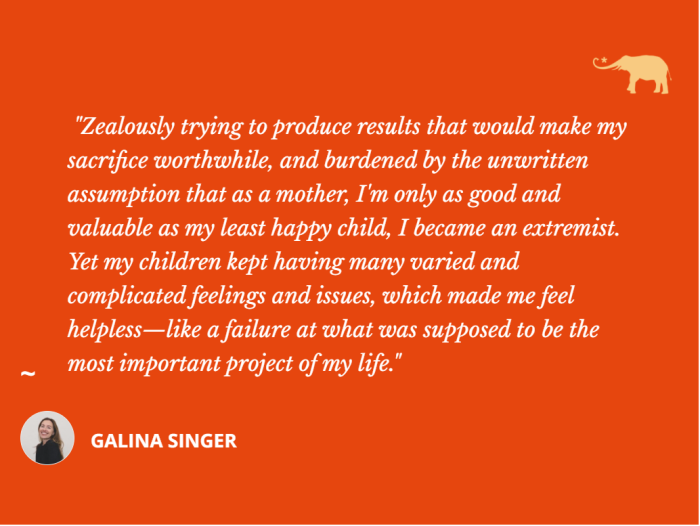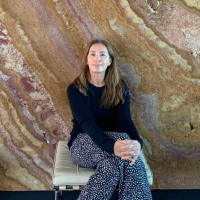View this post on Instagram
“Can you be happy and a good father?”
I am in conversation with one of my clients.
A divorced father of two, he felt guilty that, due to holiday arrangements, he did not get to spend as much time with his children as he would during a regular weekend.
When I probed, he admitted that he actually had quite nice plans during the holiday. He also had to travel for work right after, which explains why he did not see his children as much as usual. He felt guilty because he did not make more of an effort, did not make it more difficult for himself. He felt guilty because he actually enjoyed the way it all worked out.
It is as if he felt that choosing “happy and easy” made him a not good enough father. As if he can either be a happy man or a good father, but not both.
As a mother, I am familiar with this inner battle. I have been questioning this unwritten rule for a while now: can I be both? Can I pursue my own happiness and be a good mother?
Apparently, not in the world where you can only be as happy as your least happy child. This statement, repeated to me on too many occasions by women from all walks of life, dehumanizes us by denying our existence outside of our role as mothers.
Many people feel guilty to pursue happiness outside of their roles as parents or spouses. For women, in particular, motherhood has become the single most important identity, rather than one of the many roles we get to play in our lives. In codependent dynamics of patriarchal family structures, any concern with personal well-being is often viewed as selfish. Being viewed as selfish immediately disqualifies us from being a good person in the eyes of those who are watching (including the vigilant internal judge). And a selfish woman seems to be automatically disqualified as a good mother, if by no one else than herself.
Well, what even makes a good mother?
The word “sacrifice” immediately comes to mind. Oxford Dictionary defines sacrifice as “an act of giving up something valued for the sake of something else regarded as more important or worthy.”
It is true that once I became a mother, the life of my children immediately became more important and worthy than mine.
I remember my surprise when the first time taking a plane with my baby, I heard the instructions to put the oxygen mask on myself first in case of cabin depressurization during the flight. My instinct would be to put the mask on my baby first.
It was the first time I learned that when a mother cannot breathe, she cannot save anyone.
I now find myself often repeating this advice to exhausted and frazzled mothers in my practice. They’ve been sacrificing themselves to depletion and have been running on empty for years, until there is simply nothing left of them. Nothing left for them, nothing left for their children, nor for anyone or anything else they may love.
The concepts of mother and sacrifice have fused into an expectation in our culture. It is a role many of us step into with glee. A parent-martyr is a very noble role. You get great compassionate and validating nods from the onlookers. Then, there is also that inner judge: many women who tell me to what lengths they go to try to be good mothers, frequently overriding their own needs, often display an unambiguous glimmer of pride—even pleasure from this self-mutilation.
As a child, I observed both of my parents in sacrifice to the beast called duty and obligation. They cited their love for us—their children—as the reason for their self-denial.
As a result, I was also on the receiving end of a lot of unprocessed anger, violence, and other expressions of unregulated nervous systems of people who denied themselves pleasure and self-nourishment.
I faithfully inherited from my parents the pattern of dismissing my joy and happiness, accepting the unnatural definition of love as self-denial as the norm. Shutting down my own feelings, I took it upon myself to manage theirs instead, adapting to behave in ways that would avoid their anger and punishment. Among the worst things to be called in my family was “selfish.” I focused my energy on trying to make my parents proud, to validate their sacrifices for me.
Repeating what I know, I tried to be a good mother to my children through sacrifice. Zealously trying to produce results that would make my sacrifice worthwhile, and burdened by the unwritten assumption that as a mother, I’m only as good and valuable as my least happy child, I became an extremist. Yet my children kept having many varied and complicated feelings and issues, which made me feel helpless—like a failure at what was supposed to be the most important project of my life.
Looking at the impact I made—from some painful recent conversations with my now grown children—I see that self-sacrifice and the toxicity of holding other people hostage as deliverers of our happiness are not ingredients for good mothering. These are not ingredients for any healthy relating.
After much inner struggle, anguish, and disruption, I have done something unorthodox. I am the first in my family who dared to give myself permission to be happy, regardless of how my three children or anyone else in my family was doing.
In fact, I do all I can to arrive at a place where my personal well-being and happiness no longer fluctuate with the whim of people and circumstances that are completely out of my control.
It is the best thing I’ve done for myself and my family. I am nourished enough to not collapse when one of the people I love is going through a rough patch and needs the safety of my nonjudgmental, detached, wise presence. I couldn’t be that when my happiness and capacities depended on everyone’s good mood.
By freeing myself, I free my daughters to experience their own feelings, regardless of what other family members may be going through. I want them to know that we do not all have to feel the same feeling. That they have the right to be happy from their own life experience, even when someone else may be struggling with theirs. That it’s important that we learn to live with both: compassion for others and compassion for ourselves. In fact, one cannot exist without the other.
Today, I am a firm believer that what our children need the most is happy and fulfilled parents—not stressed, not overwhelmed, not perfect, not successful, not sacrificed to depletion, while expecting everyone else to sacrifice, too.
Children need calm and relaxed parents. Parents who cultivate and model self-care. Parents with well-regulated nervous systems. Parents who can be in the present moment and attune to their children’s emotional state. Parents who can notice their child’s sadness and not freak out or try to fix it. Parents who do not withdraw love when their children are different than the images they’ve attached to when they dreamed of having a family.
Our children want and need happy parents. Not conditionally happy parents, who are only happy when their rules are followed regardless of any cost. Not parents who sacrifice, judge themselves, and police everyone else. Not parents who are focused on the least happy child, unable to be there for the child who is thriving.
They need parents who are happy and fulfilled in their own right, guilt-free, able to give the gift of generous presence and nonjudgmental attention to their children, which is the biggest gift of all.
It is only when we give ourselves permission to pursue happiness, in whatever way it means to us, that we can extend that generosity to others.
That is unconditional love. And we can only give it to others when we’ve learned how to give it to ourselves.
Learn how to build fulfilling and healthy relationships while prioritizing your relationship with yourself. Contact me for a free introductory conversation.

 Share on bsky
Share on bsky







Read 56 comments and reply